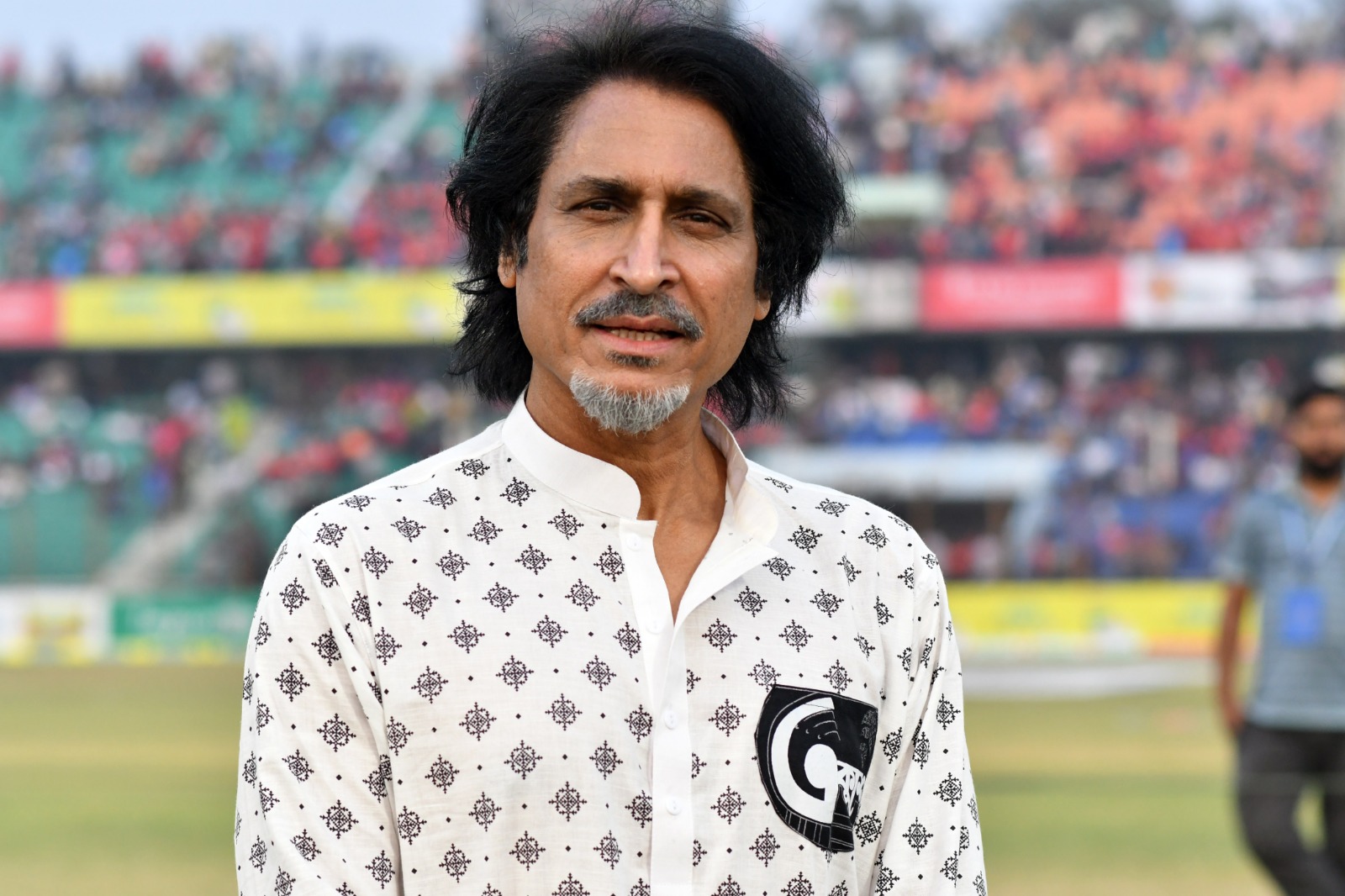
|| CF CORRESPONDENT ||
Ramiz Raja, Pakistan’s legendary cricketer and world famous commentator, is currently in the commentary panel for the 10th edition of The Bangladesh Premier League (BPL) amidst his country’s ongoing Pakistan Super League (PSL).

Ramiz, the former Pakistani opener who was also the president of the Pakistan Cricket Board, came to BPL for the first time and shared his thoughts on BPL, Pakistan Junior League (PJL) among a few other topics during an exclusive interview with Cricfrenzy.
The excerpts of the interview are below:

Cricfrenzy: Why BPL not PSL?
Ramiz: It's a commitment. Once you shake hands, when you sign on a dotted line, then it's your credibility and I'm one of those who once I sign anything, then I follow through. So whilst I miss PSL but they got in touch with me a bit later. And so my first commitment was to BPL then.
CF: How you rate BPL and how’s your commentary experience here so far?
Ramiz: So nice.. I think it's a new experience, first time here at the BPL, I mean cricket has been very absorbing and the fans have been outstanding.
The standard, you've got to source local talent to maintain standards. So the moment the local cricket as the youngsters get a hang of this, the standard will automatically improve. So I understand the value of foreign players, but it's the leagues are made not by foreign players, by local talent. So the one thing that need to be addressed as far as batting performance is concerned in BPL so far, sample size is very small for me, I've just arrived here. Teams lose wickets in a cluster, so four wickets go down. You try to find the reason why you can't. I think at times you got to have a bit of clarity in T20 cricket so that what is the goal? How do you want to bat? What you make of a certain pitch? And then you apply your skills accordingly. I think at times, some of the younger players, some of the inexperienced players just rush into doing things and that has not really benefited the team, and they've also suffered as a result.
CF: So what’s your advice to unstable young players?
Ramiz: I think you've got to have mental strength, your temperament, clarity, what you want to do. So once you get settle, I'm talking from betting perspective because I was a batsman. So it takes a little bit of time to settle down. I this is a different kind of pressure for any young cricket at T20 cricket, because they look at the scoreboard ten and over is required. So your mind goes haywire. You think that if you don't score ten of one ball that it's that kind of a mindset that kicks in.
So what you've got to do is to have clarity. What is the purpose? What is the plan? Have a plan, back yourself. I think it's so important in T20 to back yourself. You can't be under pressure all the time, but just looking at the scoreboard. So you got to be engaged in the present moment, make sure that you play the next 2 overs properly that you get give yourself time to settle down, and then you take off.
CF: You had launched a unique concept when you were the president of Pakistan cricket, Pakistan Junior League (PJL), a junior franchise league. Do you think every country should create such tournament?
Ramiz: Absolutely, it was a global event because we had Australians and South Africans and English cricket as under 19 cricket has come and they were paid quite well a young kid because you see at the end of the day, ours is a for cricket to have a livelihood, it is tough.
So I wanted to give a young kid hope that you can take cricket as a profession. So you will pick you early, will pay you also. So every kid got something like between 10,000 to US $17,000 for 10 days of 12 days of league cricket. The idea was to professionalize to create that environment under the grades of the game where they learn the art of cricket. And culturally also know each other, because that dugout was international for a 17 year old. So a 17 year old Pakistani was the captain, and he was captaining an Australian, Bangladeshi, a Sri Lankan, and learning from each other, respect each other's culture, language.
And so the idea was to make sure that our teens are put into a process where they become a good players by the time they turn 19 or 20, and also because PSL is looking to add another team or two in the next year or two, you've got to find a pool of talent. And that pool of talent has got to be 18 year olds and 19 year olds, your next generation. So I wish that it could have continued but it didn’t but I think there's a lot of potential in this concept.
CF: We see young players, especially in Asia come and vanish pretty easily, so do you think it’s the right process?
Ramiz: I think I don't know, I got in when I was pretty young, actually, there's a lot of difference when we play first class domestic cricket and international cricket, there's a huge gap.
So it's important and it's best for a young kid to straight away then make it to the to the international squad. Because what happens, there is he's in good hands. He is learning about the game all the time. And so he's not really put there, which is about two notches down from international standards. So I'm quite happy really introducing youth to international dugout, because then your process can be fast forwarded and it could benefit you more, but that's not playing a lot of domestic cricket.
CF: Domestic and International cricket are very different, so what should be the right time to introduce a player in the International arena?
Ramiz: I think whatever you see Bangladesh performance at the top level. It's a mirror. It's a reflection of how your first class cricket system is working. For example, Pakistan played when I was the chairman, two finals, one Asia cup final, we lost. We played the world cup we lost. So there's something wrong with the temperament. And that's the reflection of where our domestic cricket is. So we need to improve temperament of the players. So I got that idea when we when we lost those two finals. So it's so important to concentrate on domestic cricket. It's so important to concentrate on age cricket. You're on the 19th and the 17th, how they are looked at processed. Who are the talent scouts? What do you do with them? And they've got to be made into Bangladesh ambassadors at a very young age. So they need to be told to be disciplined. And also there's got to be this hope where the make a good livelihood.
CF: What is toughest job, PCB president, commentary or playing cricket??
Ramiz: They've all very challenging jobs, I think to be the chief of cricket board obviously is like running the country how cricket is in our part of the world. Everyone is an expert, so they want to know what you're doing, what your plans are as long as you being truthful as long as you accept that certain things you couldn't handle, I think fans will respect that.
So it's about building a relationship as an administrator with the fans, with the stakeholders. This is a lot easier for me, doing commentary, have been doing it for a long time. Playing cricket was the most difficult part, if you ask me. Because you're challenging the others, they are the world, some of the players are world's best. And so you want to pitch yourself against the world's best. At times you fail, then you've got to recover, get up again. So it's a different mindset that is needed, but all three jobs are challenging.
CF: You were PCB president for a small period of time, why is that?
Ramiz: It's just that any cricket board needs consistency. Right? Any cricket team needs consistency. If you make continuous changes, you lose confidence. And then the newcomer who heads the cricket board then comes up with new plans, with new strategy and whatever plans the previous chairman had, they're not followed.
So there is a problem. So if somebody is given 3 years term, you should allow that person to complete his 3 years term. So then only he can be accountable. It's so important, but consistency that in international teams, like, for example, Babar [Azam] and [Mohammad] Rizwan, there were suggestions when I was the chairman of the board that we should be changing the openers, because they play at a certain pace. But I said it's so important to have a solid opening pair because they established the platform. So it worked in the end just because we back them and we let them play for about a year and a half, then they became a formidable opening pair. So every organization, every cricket team needs consistency.
CF: What do you think about Shakib and Tamim’s recent incident?
Ramiz: It happens. I had plenty of cold battles with my teammates. It's part of the game. You've got little cold battles in a family. So as far as I'm concerned, it's a non-issue. Because when you played the game at the highest level, it can happen. So as long as it's not, it's nothing serious. I think such rivalry is welcome.
CF: Bangladesh team have improved a lot in bilateral series but still very behind in ICC events, what do you think about it?
Ramiz: You see, I asked this question to the Shakib Al Hasan during the World Cup that he should have batted at number three, because he's team’s best player, so he needs to be batting up the order.
I give you an example, when Viv Richards was in his prime, he was brutal when he was batting at number three, the moment he shifted to four and five positions, two wickets down. Your mind set is completely different, because then you want to consolidate and worry about not losing another wicket. When you are at number three, you play freely. I think, internationally to be at par with some of the other cricket teams. I tell this all the time back home in Pakistan, you've got to redo the pitches. You've got to make sure that there is contest between bat and ball. There are a lot of good, fine fast bowlers, as I mean Shoriful [Islam], probably bowl the best spell the other day where we saw him swing the ball with the new ball, then he bowled those white yorkers. He had a plan, so there is potential, but potential can only be there until it’s given encouragement. You don't encourage fast bowling by bowling or square turners, even though Bangladesh is home, advantage is spin. But I think domestically there's got to be a better balance between bat and ball.
CF: So you think Bangladesh need to improve pitches?
Ramiz: I think pitches are so important that 22 yards really define you as a cricket nation. So we suffered at the hands of Australia and England because we weren't prepared and look after pitches the way we wanted to. It's important that you do everything in your power to prepare good sporting pitches. I think that will improve Bangladesh cricket great deal.
CF: Can we see you in the BPL again?
Ramiz: I'll be here if invited, I'll come again.



